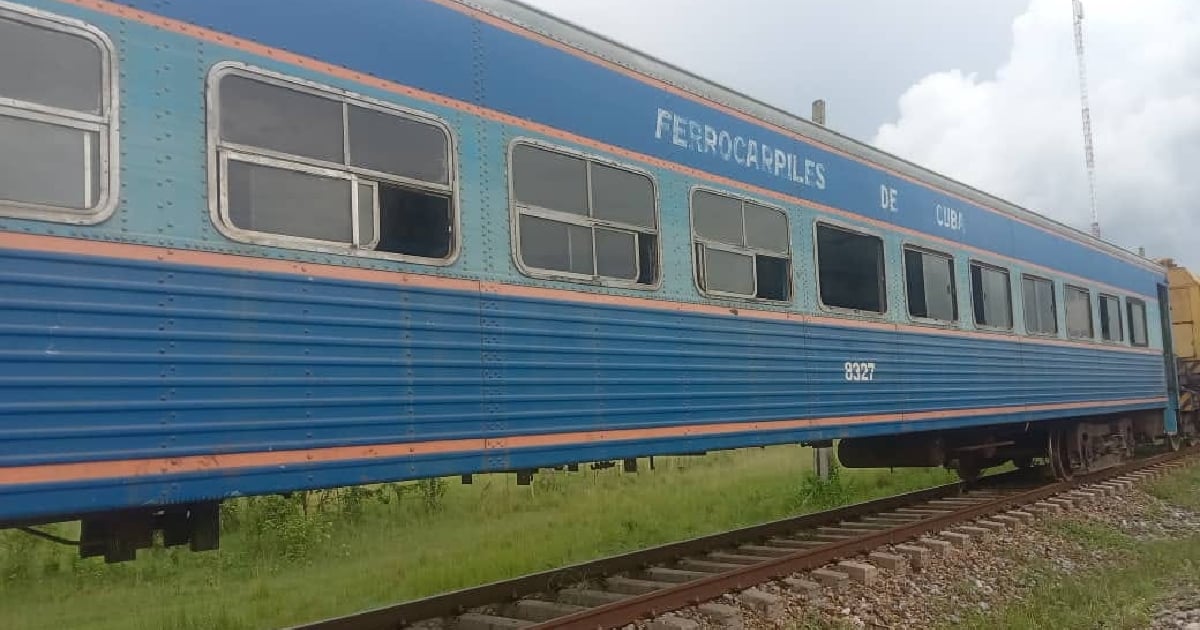
At a time when the chronic public transportation crisis is hitting Cubans harder, the Union of Railroads of Cuba (UFC) canceled the train route Los Arabos–Matanzas, which transported more than 700 passengers per week and suffered a derailment at the end of September, due to "not having more cars" to replace it.
Two weeks after the accident involving Extra Train 107, with locomotive 38209, at kilometer 149.2 of the Central Line, between the stations of Quintana and Jovellanos, the Minister of Transport, Eduardo Rodríguez Dávila, announced the suspension of the route.
"The Union of Railroads of Cuba (UFC) has had to cancel the operation of this local train covering the Los Arabos–Matanzas route due to a lack of more cars. This service had begun in October 2023 and operated three days a week (Monday, Wednesday, and Friday) with a capacity of 240 seated passengers. During its journey through the province of Matanzas, it had eight stops with an approximate travel time of two hours," Rodríguez explained on Facebook.
In the train accident on September 27, three passenger cars derailed and two of them were damaged, primarily affecting the seats, windows, and to some extent, the floor; moreover, traffic on the Central Line was interrupted. However, there were no reported casualties and all passengers were evacuated.
"The maneuvers to restore the damages from the accident were very complex," according to the minister. "Initially, we managed to reroute the locomotive, one car, and the driver; the other two cars were removed from the track to ensure the passage of trains. Later, with cranes, specialized equipment, and track and rescue train brigades, we managed to evacuate the two cars that had been removed from the railway."
The official reported that currently, “the three passenger cars are at the Quintana railway station and will be transferred to the Unión de Reyes Workshop, where they will undergo a repair process to correct the damage and improve their comfort.”
Rodríguez assured that the work would be carried out "in the shortest possible time, to reduce the impact on our population due to the suspension of this train."
The official stated that preserving and recovering cars and locomotives "is essential to continue providing the service that our population so desperately needs," but acknowledged that they do not have spare parts and other necessary supplies, which has led to "a decrease in the technical availability of these vital means for the operation of the railway."
At least 67% of the railway tracks in Cuba and 40% of the infrastructure projects require maintenance, according to official data released last March.
"For the maintenance of the railway, between 60,000 and 80,000 concrete sleepers are needed annually. Last year, around 15,000 were successfully financed," said Lisvany Fernández Rivero, acting general director of the Railway Transport Administration, on the official program "Mesa Redonda."
The official admitted that only 12 large locomotives were operating in the country, out of the 34 needed to transport passengers and cargo.
Train derailments have been quite frequent during 2024, although no fatalities or injuries have been reported, only material damage.
Days before the Los Arabos–Matanzas train accident, two trains derailed in the same week: one that was headed to the Central University "Marta Abreu" of Las Villas (UCLV), which went off a secondary track; and the locomotive 312055 of the Extra Train 69, a cargo train, which derailed and overturned three container flatcars at kilometer 151 of Matanzas, between the Central Line stations of Quintana and Jovellanos.
In August, the national train No. 18, which covered the Manzanillo-Havana route, suffered a derailment in the municipality of Jobabo, Las Tunas.
What do you think?
COMMENTFiled under: